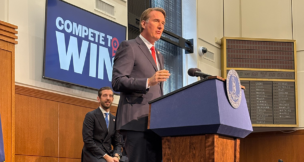The recruitment crunch
Concentrating on the “Cs” — culture, community, career, college connections — helps Virginia businesses attract skilled workers at a time when the unemployment rate is unusually low.
Virginia’s seasonally adjusted unemployment rate was 3.1 percent in July, the lowest level since 2007. Even companies in areas of the state with relatively high unemployment rates are finding it hard to fill jobs in some sought-after specialties.
It’s a widespread problem. Forty-five percent of companies around the world say they can’t find the skills they need, according to the Manpower 2018 Talent Shortage Survey. For companies with 250 or more employees the number is even higher, with 67 percent reporting talent shortages this year. Most of the top 10 in-demand roles today require post-secondary training and but not always a university degree.
Software company Appian counts on its culture — one that prizes discussion and debate — to set it apart in Northern Virginia’s highly competitive market. The company recently announced plans to move its headquarters from Reston to Tysons Corner. Both communities are in Fairfax County, which had an unemployment rate of 2.4 percent in July.
Appian also announced plans to add as many as 600 jobs. “We do brand-led recruiting. Benefits and compensation don’t sway people the way culture does,” says Dawn Mitchell, Appian’s senior director of talent acquisition.
Mitchell says the company doesn’t worry about competing with other companies for talent and isn’t concerned that Amazon could locate its second headquarters in Appian’s backyard.
“The focus on that isn’t important. Not every company is for everyone. We want to attract the right candidates who have a generosity of spirit, who are working toward one goal. We were founded by debaters. That way of working is inherent to Appian. Debate is core to who we are.”
Appian makes sure potential employees get a good look at what Mitchell calls a “fantastic company” by offering lots of points of contact on social media. “Appian values the whole person, and we want the channels to reflect that.”
Appian employees are excited to be moving to Tysons Corners, says Mitchell, where “a campus environment will provide more opportunities for employees to run into each other.”
Traffic in the area is a problem, she admits, but the company offers flexibility and is promoting the availability of the relatively new Silver Line Metro. And the Northern Virginia community itself is a big draw, with good schools and plenty of amenities.
In Hampton Roads, even major employers are having trouble finding the right skilled workers. In particular, the region has a “very low” supply of cybersecurity workers, according to Cyberseek, an online recruitment tool provided by the U.S. Commerce Department’s National Institute of Standards and Technology.
“We’re having to get kind of clever” to fill technology positions, says Caitlin Johnson at ABS Technology’s headquarters in Virginia Beach. The unemployment rate in Virginia Beach was 2.8 percent in July; it was 3.6 percent in Norfolk and Newport News.
ABS Technology provides managed IT services and is an IT staffing agency.
Johnson, who is a staffing solutions manager, says she sees clients in Southeast Virginia “getting more creative with specific benefits. They’re beefing up what they can offer.”
Among the benefits she’s seeing are cash bonuses, increased profit sharing, 100 percent health-care coverage, cellphone reimbursement and gym reimbursement. “One of our clients gives people a floating holiday for community service” as a way both to motivate employees and to give back to the community.
Hampton Roads companies are partnering with local universities to build cybersecurity curricula, Johnson says, and “they’re expanding internship opportunities so students get to shadow employees and get hands-on experience.”
Even in counties where unemployment remains higher than 5 percent — Buchanan, Dickenson, Northumberland and Wise — there are often shortages of skilled workers in areas such as IT and health care.
Ballad Health, which operates 21 hospitals in Southwest Virginia and Northeast Tennessee, emphasizes the abundance of opportunities for career development, says Debbie Dover, senior vice president of talent engagement and chief human resource officer. Ballad was formed earlier this year in the merger of Mountain States Health Alliance and Wellmont Health System.
There are plenty of examples of employees coming into entry-level positions such as food service who take advantage of tuition reimbursement and move up into IT, nursing, even leadership positions, says Dover. Employees may start in a small rural area but move choose to larger locations such as Johnston City, Tenn., or the Bristol area.
“In a health system our size, you can grow your career. We have opportunities,” Dover says. Ballad has three critical-access hospitals, three tertiary referral centers, community hospitals, a children’s hospital, a behavioral health hospital, an addiction treatment facility and long-term care facilities. It also offers home care, hospice services, outpatient services and retail pharmacies. “Once you’re here, the doors are open.”
The company offers flexibility where possible, she says. “It depends on the position. It’s hard for employees who are working with patients,” but many workers can choice to be full time, part time or on call.
Ballard works its college connections in the region: Virginia Highlands Community College, Southwest Virginia Community College, Mountain Empire Community College, Wytheville Community College, Emory & Henry College and University of Virginia at Wise.
“We have interns who come through to become registered nurses. It’s to our advantage as well as theirs because then potential applicants will already know where they want or don’t want to go, instead of having no exposure to the job,” Dover says.
Ballad believes in a getting a jump on developing homegrown talent, she adds. “We start in high school, even in middle school, because we want to introduce health-care careers as an option.”
Ballard also likes to be able to emphasize the community service aspect of its work.
“We work with area schools and we build on staying local. We tell kids: We will employ you; you can serve your local community,” Dover says.
e
















